Ditapis dengan

E-book Perspectives on the Self Reflexivity in the Humanities
The volume develops the concepts of the self and its reflexive nature as they are linked to modern thought from Hegel to Luhmann. The moderns are reflexive in a double sense: they create themselves by self-reflexivity and make their world – society – in their own image. That the social world is reflexive means that it is made up of non-subjective (or supra-subjective) communication. The vol…
- Edisi
- -
- ISBN/ISSN
- 9783110698459
- Deskripsi Fisik
- 284 hlmn
- Judul Seri
- -
- No. Panggil
- 128.4 MAT p

E-book Happiness and the Psychology of Enlightenment An Investigation into M…
Whilst happiness usually comes from how we think and feel about our life (eventbased wellbeing), enlightenment is an internal experience not sourced from this process (inner wellbeing). In this volume, we look from a scientific point of view at the different approaches to enlightenment and the practices that trigger it. This includes classical Western approaches to contemplation and aesthetics,…
- Edisi
- -
- ISBN/ISSN
- 9780850148619
- Deskripsi Fisik
- -
- Judul Seri
- -
- No. Panggil
- 158.1 JON h
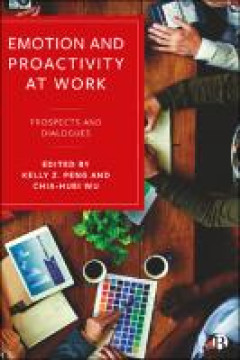
E-book Emotion and Proactivity at Work
Individuals’ behaviours at work are known to be shaped by cold, or cognitive-motivational, processes as well as hot, or affect-motivational, processes. To date, employee proactivity research has mainly focused on the ‘cold’ side. But emotion has been proposed to ‘energize’ employees’ proactivity, especially in interdependent and uncertain work environments. In this pioneering work, …
- Edisi
- -
- ISBN/ISSN
- 9781529212631
- Deskripsi Fisik
- -
- Judul Seri
- -
- No. Panggil
- 158.7 PEN e

E-book Stinking Philosophy! Smell Perception, Cognition, and Consciousness
The nature of olfaction; its importance for understanding perennial issues of philosophy of mind, perception, and consciousness; and its implications for cognitive neuroscience.What are smells? Despite the best efforts of philosophy and the chemosciences, the question remains vexing—but no more perplexing than the historical lapse of the past few centuries to seriously consider a sense that h…
- Edisi
- -
- ISBN/ISSN
- 9780262548885
- Deskripsi Fisik
- 248 hlmn
- Judul Seri
- -
- No. Panggil
- 121 YOU s

E-book Kand and Artificial Intelligence
How are artificial intelligence (AI) and the strong claims made by their philosophical representatives to be understood and evaluated from a Kantian perspective? Conversely, what can we learn from AI and its functions about Kantian philosophy’s claims to validity? This volume focuses on various aspects, such as the self, the spirit, self-consciousness, ethics, law, and aesthetics to answer th…
- Edisi
- -
- ISBN/ISSN
- 9783110706543
- Deskripsi Fisik
- 297 hlmn
- Judul Seri
- -
- No. Panggil
- 193 SCH k

E-book Artifacts of Thinking: Reading Hannah Arendt's "Denktagebuch"
'Artifacts of Thinking: Reading Arendt’s 'Denktagebuch'' offers a path through Hannah Arendt’s recently published 'Denktagebuch', or 'Book of Thoughts.' In this book a number of innovative Arendt scholars come together to ask how we should think about these remarkable writings in the context of Arendt’s published writing and broader political thinking. Unique in its form, the 'Denktagebuc…
- Edisi
- -
- ISBN/ISSN
- 9780823272174
- Deskripsi Fisik
- -
- Judul Seri
- -
- No. Panggil
- 193 BER a

E-book The Roots of Respect: A Historic-Philosophical Itinerary
Despite the increasing concern for the issue of respect for persons displayed over the last decades by political philosophers, human-right thinkers, social and ethical theorists, a comprehensive treatment of the problem from a historical-philosophical perspective is conspicuously absent. The present collection of essays aims to contribute to the fulfillment of this gap by offering a reconstruct…
- Edisi
- -
- ISBN/ISSN
- 9783110526288
- Deskripsi Fisik
- -
- Judul Seri
- -
- No. Panggil
- 170 GIO t
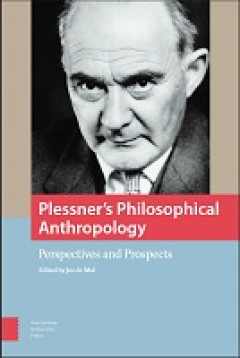
E-book Plessner's Philosophical Anthropology
Helmuth Plessner (1892-1985) was one of the founders of philosophical anthropology, and his book The Stages of the Organic and Man, first published in 1928, has inspired generations of philosophers, biologists, social scientists, and humanities scholars. This volume offers the first substantial introduction to Plessner’s philosophical anthropology in English, not only setting it in context wi…
- Edisi
- -
- ISBN/ISSN
- 9789048522989
- Deskripsi Fisik
- 482 hlmn
- Judul Seri
- -
- No. Panggil
- 128 MUL p

E-book [Given, If, Then]: A Reading in Three Parts
[Given, If, Then] attempts to conceive a possibility of reading, through a set of readings: reading being understood as the relation to an Other that occurs prior to any semantic or formal identification, and, therefore, prior to any attempt at assimilating, or appropriating, what is being read to the one who reads. As such, it is an encounter with an indeterminable Other, an Other who is other…
- Edisi
- -
- ISBN/ISSN
- 9780692298374
- Deskripsi Fisik
- 116 hlmn
- Judul Seri
- -
- No. Panggil
- 121 FER G

E-book Knowledge, Being and the Human Some of the Major Issues in Philosophy
This book, in the form of a classical philosophical treatise, presents a large-scale theoretical project: It uses a metaphilosophical perspective to present the framework for postmetaphysical thinking, situating it in the domain of the metaphysics of morality. It offers an innovative defence of scepticism based on a critical and radical analysis of the concepts of knowledge and truth. Metaphysi…
- Edisi
- -
- ISBN/ISSN
- 9783653037074
- Deskripsi Fisik
- 196 hlmn
- Judul Seri
- -
- No. Panggil
- 101 HAR k

E-book Philosophy in a Meaningless Life A System of Nihilism, Consciousness …
Provides an account of the nature of philosophy which is rooted in the question of the meaning of life. It makes a powerful and vivid case for believing that this question is neither obscure nor obsolete, but reflects a quintessentially human concern to which other traditional philosophical problems can be readily related; allowing them to be reconnected with natural interest, and providing a d…
- Edisi
- -
- ISBN/ISSN
- 9781474247689
- Deskripsi Fisik
- -
- Judul Seri
- -
- No. Panggil
- 149 TAR p
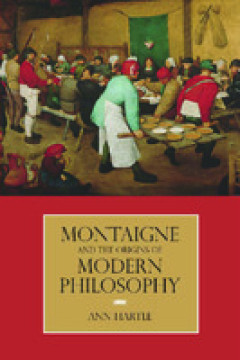
E-book Montaigne and the Origins of Modern Philosophy
Montaigne’s Essays are rightfully studied as giving birth to the literary form of that name. Ann Hartle’s Montaigne and the Origins of Modern Philosophy argues that the essay is actually the perfect expression of Montaigne as what he called "a new figure: an unpremeditated and accidental philosopher." Unpremeditated philosophy is philosophy made sociable—brought down from the heavens to t…
- Edisi
- -
- ISBN/ISSN
- 9780810129658
- Deskripsi Fisik
- -
- Judul Seri
- -
- No. Panggil
- 194 HAR m
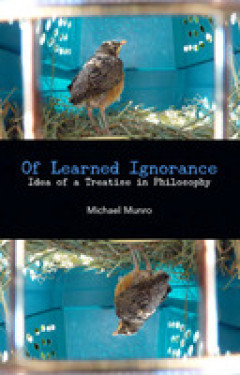
E-book Of Learned Ignorance: Idea of a Treatise in Philosophy
What is a problem? What’s asked in that question, and how does one even begin to take its measure? How else could one begin, except as one does with any other problem—by way of its impulsion. Of Learned Ignorance: Idea of a Treatise in Philosophy is about philosophy because philosophy is about problems: philosophy, in a word, is where problems become a problem. After Anti-Oedipus, in the Ka…
- Edisi
- -
- ISBN/ISSN
- 9780615822549
- Deskripsi Fisik
- 58 hlmn
- Judul Seri
- -
- No. Panggil
- 121 MUN l

E-book Thoughts and Ways of Thingking
"Why do we think differently from one another? Why do religious people adhere to their faith even against reason, whilst atheist thinkers label it “nonsense”? Why do some judges turn more to moral values and others less? Why do we attach different meanings to the same words? These questions can be tackled on psychological or sociological levels, but we can also analyze the subjects on the e…
- Edisi
- -
- ISBN/ISSN
- 9781911529231
- Deskripsi Fisik
- 186 hlmn
- Judul Seri
- -
- No. Panggil
- 121 BRO t

E-book The Poetry of Being and the Prose of the World in Early Greek Philosophy
The Presocratic philosophers, writing in Greece in the sixth and fifth centuries BCE, invented new ways of thinking about human life, the natural world, and structures of reality. They also developed novel ways of using language to express their thought. In this book, Victoria Wohl examines these innovations and the productive relation between them in the work of five figures: Parmenides, Herac…
- Edisi
- -
- ISBN/ISSN
- 9780520413320
- Deskripsi Fisik
- 253 hlmn
- Judul Seri
- -
- No. Panggil
- 182 WOH t
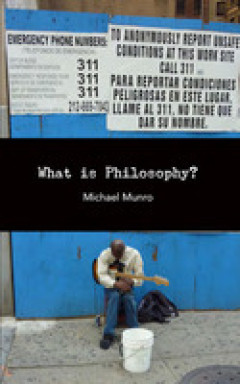
E-book What is Philosophy?
“Every written work,” Giorgio Agamben opens the preface to Infancy and History, “can be regarded as the prologue (or rather, the broken cast) of a work never penned, and destined to remain so.” Although that observation applies to any work of writing, the exemplary case is that of a work of philosophy. While every written work is put to work in its nonexistent successor, a work of philo…
- Edisi
- -
- ISBN/ISSN
- 9780615685137
- Deskripsi Fisik
- 72
- Judul Seri
- -
- No. Panggil
- 100 MUN w
Pohon Kepemimpinan : Being Responsible and Professional
Topik kepemimpinan ini selalu relevan dan dibutuhkan di berbagai bidang: bisnis, pemerintahan, organisasi sosial, pendidikan, dan kehidupan keluarga walaupun dalam skala yang berbeda-beda, tetapi umumnya orang ingin menjadi pemimpin yang baik. Seseorang menjadi pemimpin melalui proses, pemimpin yang kuat tidak lahir begitu saja. Kepemimpinan itu dikembangkan, dasar-dasarnya mungkin telah ditana…
- Edisi
- -
- ISBN/ISSN
- 9786235236537
- Deskripsi Fisik
- vii + 277 hlm; 14 x 21 cm
- Judul Seri
- -
- No. Panggil
- 158.4 ADR p
E-book Astrology and Zodiac Signs
This book includes information about astrology and astrologys ystem; Hindu, Chinese and Western.In addition,it is mostly focused on the features of zodiac signs and elements of zodiacs.
- Edisi
- -
- ISBN/ISSN
- -
- Deskripsi Fisik
- -
- Judul Seri
- -
- No. Panggil
- 133.5 VAR a

E-book Philosophy and Leadership Proposal review An Evolution of Leadersh…
Philosophy and Leadership is an ambitious exploration of leadership's philosophical underpinnings from antiquity to the AI-driven future. The book journeys through history, gleaning insights from eminent philosophers and contextualizing their teachings to leadership. The book's foundational premise lies in the symbiosis of philosophy and leadership. Philosophy provides the "why""that drives the…
- Edisi
- -
- ISBN/ISSN
- 9781040049563
- Deskripsi Fisik
- 269 hlmn
- Judul Seri
- -
- No. Panggil
- 174.4 SUL p

E-book Beyond Suspicion The Moral Clash between Rootedness and Progressive L…
For more than four decades, socially disadvantaged Israeli Mizrahim—descendants of Jews from Middle Eastern and North African communities—have continuously supported right-wing political parties. Scholars, left-wing politicians, and activists tend to view Mizrahim as reacting against their structural exclusion, or more crudely as acting against their own interests, but Nissim Mizrachi locat…
- Edisi
- -
- ISBN/ISSN
- 9780520382855
- Deskripsi Fisik
- 305
- Judul Seri
- -
- No. Panggil
- 171 MIZ b

E-book Knowledge : a Human Interest Story
In this book the author argues for a groundbreaking perspective that knowledge is inherently interest-relative. This means that what one knows is influenced not just by belief, evidence, and truth, but crucially by the purposes those beliefs serve. Drawing from classical Ny?ya epistemologies, the book asserts that knowledge rationalizes action: if you know something, it is sensible to act on it…
- Edisi
- -
- ISBN/ISSN
- 9781805113966
- Deskripsi Fisik
- 286 hlmn
- Judul Seri
- -
- No. Panggil
- 121 WEA k
E-book Conceiving People : Genetic Knowledge and the Ethics of Sperm and Egg …
What does it mean to you when I say, “These are my parents”? What would you want to know in order to figure out whether they are, in fact, my parents? Whether they are my genetic progenitors? Whether the woman on the right gestated me? Whether they raised me?We all know that the relationships captured by these questions— the ge-netic relationship, the gestational relationship, and the soc…
- Edisi
- -
- ISBN/ISSN
- 9780190063054
- Deskripsi Fisik
- 257 hlm
- Judul Seri
- -
- No. Panggil
- 174.2 GRO c

Self-Improved Me
'When will you get married?' 'Why does your child behave that way?' 'You haven't joined any pilates class yet?' 'Beyonce also has 24 hours in a day, you know?' As women, we have all been asked these questions. They insidiously creep into our minds and make us feel guilty. We start doing so much out of the fear of missing out, simply because everybody is doing it (that's how it seems on soci…
- Edisi
- Cet. 1
- ISBN/ISSN
- 9789815266153
- Deskripsi Fisik
- x, 176 hlm; 13,5 x 21,5 cm
- Judul Seri
- -
- No. Panggil
- 158.1 PUT s

Untukmu, Anak Bungsu
Orang-orang bilang, anak bungsu itu paling disayang, paling dimanja, dan yang paling diperhatikan. Padahal, anak bungsu juga adalah anak yang mudah merasa kesepian dan dilupakan, terlebih lagi di saat orang tua sudah menua dan kakak sudah sibuk dengan kehidupan masing-masing. Terkadang, anak bungsu juga harus menyimpan mimpi-mimpinya sendiri untuk mewujudkan mimpi-mimpi keluarga. "Jika bisa me…
- Edisi
- Cet. 2
- ISBN/ISSN
- 9789797948313
- Deskripsi Fisik
- iv, 152 hlm; 13 x 19 cm
- Judul Seri
- -
- No. Panggil
- 153.8 HID u

Full Soal HOTS Higher-Order Thingking Skills FOKUS MENGHADAPI PSIKOTES METODE…
Fokus Menghadapi Psikotes hadir sebagai solusi bagi Anda yang ingin sukses dalam menghadapi bergabai jenis Psikotes. Buku ini disusun oleh tim yang sudah berpengalaman; beranggotakan praktisi-praktisi Psikometri. Anda akan mendapatkan berbagai macam pembahasan Psikotes yang terdiri atas Penalaran Verbal, Penalaran Kuantitatif, Penalaran Figural, dan Tes Psikometri.
- Edisi
- -
- ISBN/ISSN
- 978602571010
- Deskripsi Fisik
- vi + 450 hlm.;
- Judul Seri
- -
- No. Panggil
- 155.25 TIM F

Rahasia Sukses Personal Branding Untuk di Era Pemula Society
Buku ini tidak hanya bertujuan untuk memberikan panduan praktis dalam membangun personal branding yang kuat, tetapi juga untuk mengajak kita merenung, menggali, dan mengembangkan potensi diri yang mungkin belum kita sadari.
- Edisi
- -
- ISBN/ISSN
- 9786235480213
- Deskripsi Fisik
- viii + 242 hlm.; 13 cm x 19 cm
- Judul Seri
- -
- No. Panggil
- 150.1 FIN r

Conversation on Love: Bagaimana Cinta Berakhir dan Bagaimana Ia Bermula
Setelah bertahun-tahun merasa bahwa cinta selalu berada di luar jangkauan, jurnalis Natasha Lunn mencoba memahami bagaimana cinta bekerja dan berkembang sepanjang hidup. Dia menemui para penulis, terapis, tokok budaya, dan pakar untuk mempelajari pengalaman mereka, mulai mendalami kompleksitas cinta? Bagaimana kita mempertahankannya? dan bagaimana kita bisa bertahan ketika kehilangannya? Mel…
- Edisi
- 2
- ISBN/ISSN
- 9786020677071
- Deskripsi Fisik
- xvi + 352 hlm.;19cm x 13 cm
- Judul Seri
- -
- No. Panggil
- 158.2 NAT c

Kamu Tidak Istimewa
Riwayat ini mengandung banyak paham. Bias Prasangka hadir melengkapi desus. Remuk rendam menjadi sorakan. Bimbang. Barangkali Jenaka? Atma lunglai rasa tak menapak. Kosong termanipulasi gelagatnya sendiri. Piala " penderitan terbaik" tergenggam erat. Enggan lepas. Hingga sebuah utas melingkupi. Yang istimewa bukan hanya kamu. Dirimu jauh dari satu-satunya. Allah mencintai semua. Berikut g…
- Edisi
- 5
- ISBN/ISSN
- 978623005574
- Deskripsi Fisik
- xi + 92 hlm
- Judul Seri
- -
- No. Panggil
- 155.25 NAT k

Seorang Wanita yang Ingin Menjadi Pohon Semangka di Kehidupan Berikutnya
Jawab dengan cepat: Seandainya terlahir kembali di kehidupan berikutnya, kamu ingin menjadi apa? Berikut beberapa jawaban unik yang pernah kudengar baik dalam ruang praktik maupun ketika ngobrol santai dengan teman-teman: "Aku ingin menjadi ubur-ubur, melayang bebas tanpa tekanan atasan dan ekspektasi sosial." "Aku ingin menjadi pohon pinus, karena tinggi dan keren." "Aku ingin menjadi ikan …
- Edisi
- Cet. 4
- ISBN/ISSN
- 9786020681276
- Deskripsi Fisik
- xviii, 206 hlm; 13,5 x 20 cm
- Judul Seri
- -
- No. Panggil
- 158.1 AND s

Ibu, Aku Nggak Sekuat Itu
Ibu, aku nggak sekuat itu. Ada banyak hal yang aku sembunyikan dari ibu. Tentang aku yang sering menangis di kamar sendirian, menangis di perjalanan pulang. Juga menangis karena beratnya hidup ketika harus jadi tulang punggung keluarga sejak sekecil ini. Ternyata jadi dewasa nggak enak, ya, bu? Aku kangen ibu. Aku pengin jadi anak kecil aja, pengin balik ke masa lalu aja, pengin main sepeda sa…
- Edisi
- Cet. 3
- ISBN/ISSN
- 9786231063076
- Deskripsi Fisik
- 216 hlm; 13 x 19 cm
- Judul Seri
- -
- No. Panggil
- 155.25 HEL i
Filosofi Teras : Filsafat Yunani-Romawi Kuno untuk Mental Tangguh Masa Kini (HC)
Lebih dari 2000 tahun lalu, sebuah mazhab filsafat menemukan akar masalah dan juga solusi dari banyak emosi negatif. Stoisisme atau Filosofi Teras adalah filsafat Yunani-Romawi kuno yang bisa membantu kita mengatasi emosi negatif dan menghasilkan mental yang tangguh dalam menghadapi naik turunnya kehidupan. Jauh dari kesan filsafat sebagai topik berat dan mengawang-awang, Filosofi Teras justru …
- Edisi
- -
- ISBN/ISSN
- 9786233469319
- Deskripsi Fisik
- illust, xxviii + 352 hlm; 14 x 21 cm
- Judul Seri
- -
- No. Panggil
- 171 MAN f
2 Detik yang menentukan Kesuksesan Anda
Buku ini adalah gabungan mengesankan dari penelitian dan contoh-contoh praktis bahwa memiliki sedikit informasi yang tepat, pada waktu dan konteks yang tepat, secara cukup memadai ke depan adalah kunci utama kesuksesan dalam bisnis dan dalam bidang-bidang usaha manusia yang lainnya. Penulis memberikan perspektif menarik soal bagaimana kemampuan peramalan yang tersedia bisa membantu kita menjadi…
- Edisi
- -
- ISBN/ISSN
- 9786020313733
- Deskripsi Fisik
- xi + 255 hlm; 15 x 22 cm
- Judul Seri
- -
- No. Panggil
- 158.1 RAN d
Hidden Potential
Kita hidup di dunia yang terobsesi dengan bakat. Kita memuja-muja siswa berbakat di sekolah, atlet genius dalam olahraga, dan anak ajaib dalam musik. Namun, mengagumi orang-orang yang memulai sesuatu dengan keunggulan bawaan lahir membuat kita mengabaikan jarak yang bisa kita tempuh untuk mencapai kejayaan. Kita meremehkan berbagai keterampilan yang bisa kita pelajari dan seberapa jauh kita bis…
- Edisi
- -
- ISBN/ISSN
- 9786020679020
- Deskripsi Fisik
- 320 hlm; 15 x 22.5 cm
- Judul Seri
- -
- No. Panggil
- 155.25 GRA h
Berani Hidup
Berani hidup atau hidup yang berani mengandaikan kesediaan menghadapi tantangan kehidupan serta menjawab tantangan tersebut dengan berbagai sarana yang disediakan kehidupan. Berani hidup juga berarti kesiapan untuk menerima realita yang tidak sesuai dengan harapan seseorang disertai dengan semangat untuk mengubahnya melalui sarana dan berdasarkan prinsip-prinsip yang benar. Hidup berani adalah …
- Edisi
- -
- ISBN/ISSN
- 9786021745304
- Deskripsi Fisik
- iv + 81 hlm; 13 x 20 cm
- Judul Seri
- -
- No. Panggil
- 144 NUR b
Goresan Anak Senja
Sebentar lagi Gonzaga mencapai usianya yang ke-30. Usia yang seharusnya sebuah manusia atau lembaga sudah memiliki karakter dan ciri khas. Usia dimana ia sudah memberikan sumbangan nyata bagi lingkungan dan bangsa dimana ia berdiri.Kolose Gonzaga memiliki fokus perhatian pada 3 arah programatik, yaitu: Kemiskinan, Kerusakan Lingkungan, dan fundamentalisme agama.Atas dasar tiga latar belakang te…
- Edisi
- -
- ISBN/ISSN
- 9786020448411
- Deskripsi Fisik
- 140 hlm; 14 x21 cm
- Judul Seri
- -
- No. Panggil
- 158.1 TIM g

The Best Of Chinese Life Philosiphies : Temukan dan manfaatkan faktor penentu…
Tahukan Anda bahwa untuk hidup sukses Anda tidak cukup hanya bekerja keras, namun harus pula menemukan faktor-faktor penentu kesuksesan dan kemudian menyelaraskan dengan kehidupan? Faktor takdir, nasib, bakat, kemampuan memanfaatkan momentum (waktu dan tempat yang tepat), dukungan orang-orang di sekitar, pengembangan internal (diri sendiri), pemanfaatan faktor kali (leverage) serta teknologi…
- Edisi
- -
- ISBN/ISSN
- 9789792223042
- Deskripsi Fisik
- xi + 177 hlm.; 21 cm x 14 cm
- Judul Seri
- -
- No. Panggil
- 181.11 LEM t
Mega Drilling Psikotes
Buku ini dilengkapi dengan penjelasan yang akan membantu anda dalam memahami materi psikotes verbal dan non verbal untuk seleksi masuk BUMN, BUMD, Swasta, dan Umum. Latihan soal disajikan dengan jawaban, pembahasan, tips dan trik mengerjakan soal yang mudah dipahami pembaca.
- Edisi
- -
- ISBN/ISSN
- 9786020529714
- Deskripsi Fisik
- vi + 384, illust; 19 x 26 cm
- Judul Seri
- -
- No. Panggil
- 153.93 WUL m
Seorang Pria yang Melalui Duka dengan Mencuci Piring
Ketika menyambut pasien yang sedang berduka, seorang psikiater akan menggali keilmuan yang dimiliki. Dia akan mengulik semua teori duka yang pernah dipelajari di masa kuliah dulu dan mengingat pengalaman dari pasien-pasien sebelumnya. Kemudian, dia menyintesis itu untuk membantu pasien yang sedang berduka di hadapannya. Tapi, ketika Andreas - seorang psikiater - kehilangan anaknya, dia melakuka…
- Edisi
- -
- ISBN/ISSN
- 9786020674674
- Deskripsi Fisik
- xiii + 192 hlm; 13.5 x 20 cm
- Judul Seri
- -
- No. Panggil
- 155.25 KUR s

100% Jitu Jawab Tes Gambar dan Angka dalam Psikotes
Psikotes sering kali dianggap "monster" menakutkan bagi sebagian besar orang, terutama tes gambar dan angka. Betapa tidak, hasil penilaian tes ini tidak berdasarkan siapa yang paling pintar, karena bisa saja orang yang secara akademik tidak begitu pintar justru mampu mengalahkan orang yang lebih pintar. Akibatnya, banyak orang yang sebenarnya pintar namun gagal berulang kali dalam psikotes. Su…
- Edisi
- Cet. 1
- ISBN/ISSN
- 9786027695504
- Deskripsi Fisik
- 256 hlm; 21 x 28 cm
- Judul Seri
- -
- No. Panggil
- 155.28 DWI s
Revolusi Cara Belajar
Inilah buku luar biasa yang merekam rahasia-rahasia prestasi puncak manusia di era pergantian milenium. Bagian kedua ini menyajikan terobosan-terobosan mutakhir di bidang pendidikan, yang memadukan dunia sekolah, bisnis, dan komunikasi instan dari internet. Ditulis dengan ketekunan akademis dan kegairahan yang luarbiasa, berdasarkan penelitian doktoral Jeanette Vos dan rekaman berbagai terobosa…
- Edisi
- -
- ISBN/ISSN
- 9799452120
- Deskripsi Fisik
- ix + 541 hlm; 15.5 x 23.5 cm
- Judul Seri
- -
- No. Panggil
- 153 DRY r
Student Centered Leadership
This book offers a timely and thoughtful resource for school leaders who want to turn their ideals into action. Written by educational leadership expert Viviane Robinson, the book shows leaders how they can make a bigger difference to the quality of teaching and learning in their school and ultimately improve their student's performance. This book also is based not on fad or fashion but on the…
- Edisi
- -
- ISBN/ISSN
- 978118090275
- Deskripsi Fisik
- xi + 167 hlm; 15 x 23 cm
- Judul Seri
- -
- No. Panggil
- 158.4 ROB s
The Inspiration of Tao Zhu-gong : Modern Business Lessons from an Ancient Past
This book discusses the 12 business principles of Tao Zhu-gong and relates them to today's corporate setting. They state 12 vital abilities that one will need in order to succeed in business. Ranging from handling customers and employees to managing a company and its products to making business decisions, the principles cover most of the areas necessary for a business to develop. The 12 princip…
- Edisi
- -
- ISBN/ISSN
- 0130605654
- Deskripsi Fisik
- ix + 311 hlm; 15 x 23.5 cm
- Judul Seri
- -
- No. Panggil
- 174.4 CHO t
Linking leadership to Student Learning
This book clearly shows how to school leadership improves student achievement. The book based on an ambitious five-year study on educational leadership that was sponsored by The Wallace Foundation. The authors studied 43 districts, across 9 states and 180 elementary, middle, and secondary schools. In this book, the author report on what they found. The results within will have significant impli…
- Edisi
- -
- ISBN/ISSN
- 9780470623312
- Deskripsi Fisik
- xxiii + 275 hlm; 18 x 23cm
- Judul Seri
- -
- No. Panggil
- 158.1 LEI l
The 21 Irreffutable Laws of Leadership Tested by Time = 21 Hukum Kepemimpinan…
Anda bisa menjadi pemimpin. Lebih dari lima juta kopi buku karya John Maxwell, 21 Hukum Kepemimpinan Sejati, laris terjual, memberdayakan pria wanita dalam keterampilan memimpin. Dalam 21 Hukum Kepemimpinan Sejati Teruji oleh Waktu, Jim Garlow menelaah bagaimana orang biasa sepanjang zaman telah menggunakan ke-21 hukum ini untuk menjadi pemimpin yang paling besar kuasanya, disegani, dan berpeng…
- Edisi
- -
- ISBN/ISSN
- -
- Deskripsi Fisik
- 353 hlm; 15.5 x 24 cm
- Judul Seri
- -
- No. Panggil
- 158.1 GAR t
E-book Monkey Trouble : The Scandal of Posthumanism
The human is a source of trouble for posthumanism. Committed to dis-turbing the opposition between human and nonhuman, posthumanist theory has tended to sideline the human from the scene of its theoretical engagements with otherness. The human has become akin to the “Invisible Gorilla” made famous by psychologists Christopher Chabris and Daniel Simons. Seeking to establish …
- Edisi
- -
- ISBN/ISSN
- 9780823277797
- Deskripsi Fisik
- 168 hlm
- Judul Seri
- -
- No. Panggil
- 111 PET m
E-book The Discovery of Anxiousness
The subject of my book is a Portuguese Cistercian nun, Joana de Jesus (1617–1681),whowroteanautobiographicalmysticaltext.However,themostfamousPortuguesenun is still Mariana Alcoforado (1640–1723),probably the fictional author of theLet-tresPortugaises.1Thisbook–anardentcorrespondencebetweenacloisterednunanda French aristocrat – had wide appeal in the European literary scene of its time.…
- Edisi
- -
- ISBN/ISSN
- 9783839465325
- Deskripsi Fisik
- 277 hlm
- Judul Seri
- -
- No. Panggil
- 102 SER t
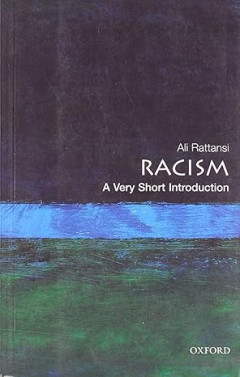
E-book Racism: A Very Short Introduction
From subtle discrimination in everyday life, to horrors like lynching in the Old South, cultural imperialism, and "ethnic cleansing", racism exists in many different forms, in almost every facet of society. Despite civil rights movements and other attempts at progress, racial prejudices and stereotypes remain deeply embedded in Western culture. Racism takes a frank and objective look at why the…
- Edisi
- -
- ISBN/ISSN
- 9780192805904
- Deskripsi Fisik
- 209 halaman
- Judul Seri
- -
- No. Panggil
- 170.01 RAT p
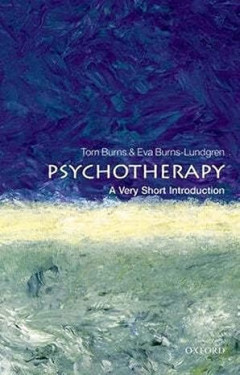
E-book Psychotherapy: A Very Short Introduction
Psychotherapy and counselling are now widely available to help people overcome emotional and psychological difficulties in their lives. They involve spending time with a professional in an emotionally safe and structured relationship to explore and express the issues that cause distress and difficulty, such as long term self-doubts, relationship problems, or the impact of a trauma or crisis. As…
- Edisi
- -
- ISBN/ISSN
- 9780199689361
- Deskripsi Fisik
- 346 halaman.
- Judul Seri
- -
- No. Panggil
- 131 BUR p

Ebook Privacy: A Very Short Introduction
It is widely recognized that our privacy is under threat. Electronic surveillance, biometrics, CCTV, ID cards, RFID codes, online security, encryption, the interception of email, the monitoring of employees--all raise fundamental questions about privacy. Legal expert Raymond Wacks here provides a compact introduction to this complex and controversial concept. He explores the tension between fre…
- Edisi
- -
- ISBN/ISSN
- 9780199556533
- Deskripsi Fisik
- 176 halaman
- Judul Seri
- -
- No. Panggil
- 170.01 WAC p
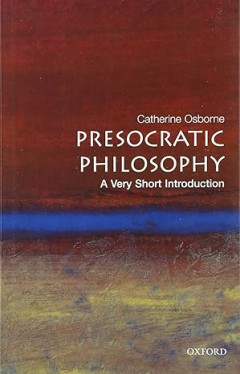
E-book Presocratic Philosophy: A Very Short Introduction
Generations of philosophers, both ancient and modern, have traced their inspiration back to the Presocratics. Part of the fascination stems from the fact that little of what they wrote survives. Here Osborne invites her readers to dip their toes into the fragmentary remains of thinkers from Thales to Pythagoras, Heraclitus to Protagoras, and to try to reconstruct the moves that they were making…
- Edisi
- -
- ISBN/ISSN
- 9780192840943
- Deskripsi Fisik
- 176 pages
- Judul Seri
- -
- No. Panggil
- 182 OSB p
 Karya Umum
Karya Umum  Filsafat
Filsafat  Agama
Agama  Ilmu-ilmu Sosial
Ilmu-ilmu Sosial  Bahasa
Bahasa  Ilmu-ilmu Murni
Ilmu-ilmu Murni  Ilmu-ilmu Terapan
Ilmu-ilmu Terapan  Kesenian, Hiburan, dan Olahraga
Kesenian, Hiburan, dan Olahraga  Kesusastraan
Kesusastraan  Geografi dan Sejarah
Geografi dan Sejarah